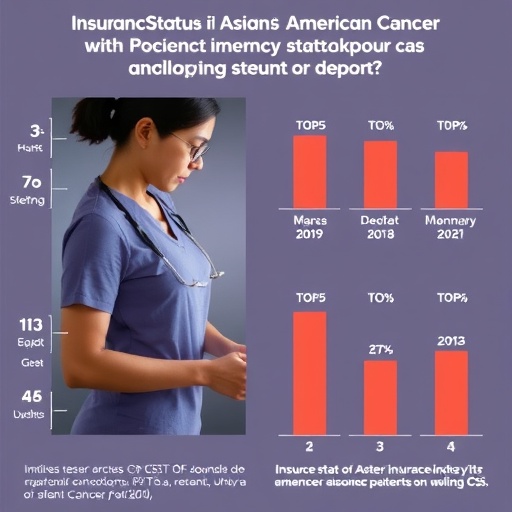In an enlightening exploration of healthcare accessibility, recent research focusing on the insurance status of Asian Americans diagnosed with cancer sheds light on critical disparities in the healthcare landscape. This study, conducted by a team of dedicated researchers, aims to dissect the intricate layers of healthcare authority among Asian American populations, a group often overlooked in broader analyses of cancer care.
Cancer, recognized as one of the leading causes of death globally, does not just affect individuals; it impacts entire families and communities. The burden of cancer is particularly heavy among minority populations in the United States, where variations in access to quality health care can result in significant differences in treatment outcomes and overall survival rates. The research team comprised of Nguyen, Nguyen, and Feng, along with contributing authors, diligently analyzed data to present a comprehensive understanding of the insurance status that underlies cancer care for Asian Americans.
A significant challenge the researchers faced was the broad spectrum of Asian American identities. This demographic is incredibly diverse, including individuals from various countries, cultures, and socioeconomic backgrounds. This diversity can manifest in differing healthcare experiences and outcomes, which are crucial for accurate assessment and intervention. By employing a disaggregate approach, the study endeavors to refine the representation of these experiences, ensuring that the findings reflect more than just a monolithic narrative about Asian Americans.
The analysis conducted within this study evaluates how different segments within the Asian American community navigated the healthcare system, particularly focusing on their insurance status at the time of their cancer diagnosis and throughout treatment. Many Asian Americans encounter systemic barriers, which can complicate their access to vital health services, and the research sought to elucidate these challenges further.
Insurance coverage is a fundamental aspect of healthcare access and quality. Individuals with reliable health insurance often experience smoother pathways to necessary treatments and services. Conversely, those lacking coverage or possessing inadequate insurance not only face financial burdens but may also delay or forgo critical treatments altogether. This research highlights the stark realities for many Asian Americans who find themselves caught in the limbo of inadequate insurance, complicating their already daunting battle against cancer.
The study’s results revealed startling disparities between various subgroups within the Asian American population. For instance, while some subgroups were well-represented in health insurance coverage, others demonstrated alarmingly low levels of insurance that could dramatically influence treatment options. The implications of these findings underscore the necessity for targeted policies aimed at improving insurance coverage among the most vulnerable populations.
The implications of insurance status extend far beyond access to care. They resonate through various dimensions of health outcomes, including the likelihood of receiving timely diagnoses, the nature and intensity of subsequent treatments, and overall survival rates. By analyzing the nuanced aspects of healthcare access among Asian Americans, this research brings to the forefront the importance of disaggregated data in capturing the real-world experiences faced by minority populations.
While the findings present a sobering look at the state of healthcare access within this community, the researchers remain optimistic about the potential for positive change. Armed with this data, advocates and policymakers can work collaboratively to create informed strategies that address these discrepancies. Potential initiatives may include increasing outreach efforts to educate Asian American communities about their health insurance options or implementing policies designed specifically to reduce systemic barriers facing these populations.
Furthermore, the study suggests that healthcare providers must incorporate cultural competency into their practice. A nuanced understanding of the cultural contexts that shape patient experiences can lead to more respectful and relevant care. By fostering an inclusive environment, healthcare systems can begin to enhance trust, ultimately encouraging more patients to seek needed care without fear of judgment or misunderstanding.
The study meticulously outlines areas for further research, acknowledging that understanding the correlation between insurance status and health outcomes is a complex endeavor that warrants continued examination. Future studies could expand the focus to include longitudinal analyses that track insurance changes over time, alongside corresponding shifts in health outcomes among Asian Americans battling cancer.
This intricate narrative about the insurance landscape among Asian Americans diagnosed with cancer not only contributes to the medical literature but also serves as a clarion call for urgency in addressing the inequities present within the healthcare system. In the face of systemic racism, poverty, and language barriers, the insights gleaned from this study can catalyze meaningful conversations and actions that aim to reform healthcare for underrepresented groups.
Ultimately, the research presented lays the groundwork for ongoing dialogue surrounding healthcare access and necessitates a collective effort from various sectors—healthcare providers, policymakers, community advocates—to dismantle the barriers that inhibit equitable access to cancer care. By doing so, we can strive towards a future where all individuals, regardless of their background, receive the quality healthcare they deserve.
Focused on unveiling the truths surrounding insurance coverage and cancer treatment for Asian Americans, this research epitomizes the vital connection between data-driven analyses and the advocacy needed to fuel progressive change. It serves as a reminder that healthcare is not merely a commodity but a basic human right that must be protected and accessible to all.
Subject of Research: Insurance Status Among Asian Americans with Cancer
Article Title: Insurance Status Among Asian Americans with Cancer: A Disaggregated Analysis
Article References:
Nguyen, L., Nguyen, I., Feng, E. et al. Insurance Status Among Asian Americans with Cancer: A Disaggregated Analysis. J GEN INTERN MED (2025). https://doi.org/10.1007/s11606-025-09718-w
Image Credits: AI Generated
DOI: 10.1007/s11606-025-09718-w
Keywords: Insurance Status, Asian Americans, Cancer, Health Disparities, Healthcare Access, Cultural Competency
Tags: Asian American cancer patientscancer burden in Asian communitiescancer care interventionscancer treatment disparitiescultural diversity in healthcaredisaggregate data analysis in health researchhealthcare accessibility disparitieshealthcare authority among minoritiesimproving health equity for minoritiesinsurance status in cancer careminority health outcomessocioeconomic factors in healthcare





